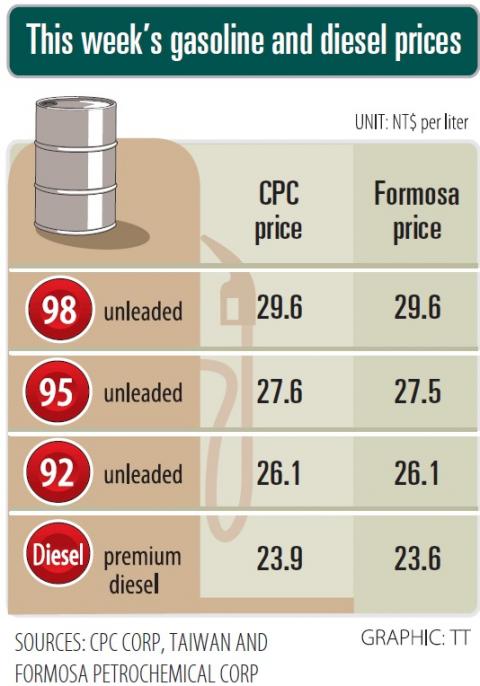CPC Corp, Taiwan (CPC, 台灣中油) and Taiwan Power Co (Taipower, 台電) are on March 21 to sign a cooperation agreement to harness geothermal energy at Renze Hot Spring (仁澤溫泉) in Yilan County, the Chinese-language Liberty Times (sister publication of the Taipei Times) reported yesterday, citing sources at the Ministry of Economic Affairs.
Under the cooperation plans, CPC would drill one or two wells near the hot spring to conduct tests, the newspaper said, adding that if the tests are successful, the state-run refiner would hand over the project to Taipower, which would be tasked with generating geothermal power.
Given the large number of hot springs in the county, the potential for geothermal energy in Yilan is huge.

CPC said it selected Renze for the tests after geological evaluation because it has greater potential to develop geothermal energy than other areas in Taiwan.
Moreover, the plots of land on the site in Renze belong to the Forestry Bureau, making the process less costly and time-consuming than if the company were to lease land from private owners, the newspaper said.
CPC has ample experience drilling geothermal wells and in 1981 helped set up a geothermal power plant in the county’s Cingshuei (清水) area, which was shut down in 1993 as its generators became less efficient.
Taipower is interested in developing geothermal energy and is simultaneously engaged in a geothermal development project on Green Island (綠島) this year.
The state-run utility has carried out well tests and is on track to build a small geothermal power station capable of generating 200kW of electricity on the island by next year, the Liberty Times said, adding that Taipower plans to build a larger geothermal power plant there capable of generating 40 megawatts of electricity by 2020.
The Bureau of Energy has said that the government’s target is to install 200 megawatts of geothermal generation capacity by 2025, as part of the Democratic Progressive Party administration’s pledge to establish a “nuclear-free homeland” by that year.
Separately, CPC yesterday announced that it would lower fuel prices this week, as crude oil prices dropped last week after Saudi Arabia lowered its prices for Arab Light sold to Asia and amid a continued increase in US crude oil inventories.
CPC said in a statement that its average crude oil cost fell by US$1.11 per barrel to US$62.41.
That means it is to cut gasoline and diesel prices by NT$0.2 per liter starting today after factoring in the New Taiwan dollar’s depreciation of NT$0.011 against the US dollar, the refiner said.

Sweeping policy changes under US Secretary of Health and Human Services Robert F. Kennedy Jr are having a chilling effect on vaccine makers as anti-vaccine rhetoric has turned into concrete changes in inoculation schedules and recommendations, investors and executives said. The administration of US President Donald Trump has in the past year upended vaccine recommendations, with the country last month ending its longstanding guidance that all children receive inoculations against flu, hepatitis A and other diseases. The unprecedented changes have led to diminished vaccine usage, hurt the investment case for some biotechs, and created a drag that would likely dent revenues and

Global semiconductor stocks advanced yesterday, as comments by Nvidia Corp chief executive officer Jensen Huang (黃仁勳) at Davos, Switzerland, helped reinforce investor enthusiasm for artificial intelligence (AI). Samsung Electronics Co gained as much as 5 percent to an all-time high, helping drive South Korea’s benchmark KOSPI above 5,000 for the first time. That came after the Philadelphia Semiconductor Index rose more than 3 percent to a fresh record on Wednesday, with a boost from Nvidia. The gains came amid broad risk-on trade after US President Donald Trump withdrew his threat of tariffs on some European nations over backing for Greenland. Huang further

CULPRITS: Factors that affected the slip included falling global crude oil prices, wait-and-see consumer attitudes due to US tariffs and a different Lunar New Year holiday schedule Taiwan’s retail sales ended a nine-year growth streak last year, slipping 0.2 percent from a year earlier as uncertainty over US tariff policies affected demand for durable goods, data released on Friday by the Ministry of Economic Affairs showed. Last year’s retail sales totaled NT$4.84 trillion (US$153.27 billion), down about NT$9.5 billion, or 0.2 percent, from 2024. Despite the decline, the figure was still the second-highest annual sales total on record. Ministry statistics department deputy head Chen Yu-fang (陳玉芳) said sales of cars, motorcycles and related products, which accounted for 17.4 percent of total retail rales last year, fell NT$68.1 billion, or

HSBC Bank Taiwan Ltd (匯豐台灣商銀) and the Taiwan High Prosecutors Office recently signed a memorandum of understanding (MOU) to enhance cooperation on the suspicious transaction analysis mechanism. This landmark agreement makes HSBC the first foreign bank in Taiwan to establish such a partnership with the High Prosecutors Office, underscoring its commitment to active anti-fraud initiatives, financial inclusion, and the “Treating Customers Fairly” principle. Through this deep public-private collaboration, both parties aim to co-create a secure financial ecosystem via early warning detection and precise fraud prevention technologies. At the signing ceremony, HSBC Taiwan CEO and head of banking Adam Chen (陳志堅)